Rebecca D. Elswick's Blog, page 4
July 10, 2013
Appalachian Superstitions
The following blog was a guest post for "The Bookish Owl."http://thebookishowl.wordpress.com/20...
GUEST POST: Appalachian Superstitions by Rebecca D. Elswick Posted by thebookishowl on July 9, 2013 in Guest Posts Superstition has always been a fascinating topic for me because of the abundance of them in the Philippines. In Tagalog, we call them “pamahiin” and it has been a constant source of laughter especially when my elders scold me and use pamahiin as their reason.
Let’s welcome Rebecca to the Owl with her very interesting topic; Appalachian Superstitions.
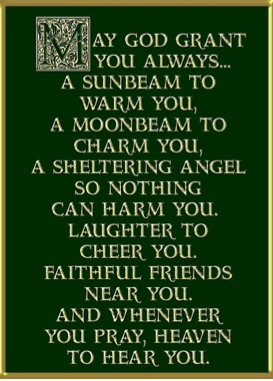 I am a child of central Appalachia, part of the oldest mountain range in North America. I grew up with the lush mountain forests as my playground, and small town life taught me a strong sense of place and a great love for and pride in my heritage. My Appalachian legacy includes its folktales, legends, superstitions, and traditional stories.
I am a child of central Appalachia, part of the oldest mountain range in North America. I grew up with the lush mountain forests as my playground, and small town life taught me a strong sense of place and a great love for and pride in my heritage. My Appalachian legacy includes its folktales, legends, superstitions, and traditional stories.
In my corner of Appalachia where coal is mined from the mountains, many people, including my family, claim Ulster-Scots, later called Scotch-Irish, as their ancestry. The pale complexion, red hair, and blue eyes are prevalent in this region. Other traits attributed to this heritage are the Appalachian peoples’ religious fervor, clannish behavior and the fierce almost feudal behavior of protecting the family, and of course, the love of moonshine ( liquor made from corn) that came about because of their inherited love of the Scotsman’s’ and Irishman’s’ love of whiskey. This American product is even more potent in its effect than true Scotch or Irish whiskey.
Much of our language and many of our rich traditions and superstitions are traceable to this ancestry. The term “hillbilly” often applied to the people of this region, may be Scottish in origin. “Hill” comes from the Scottish “hill dwellers” and the Scottish word “billies” meaning “fine fellow”.
For all their staunch self-sufficiency and love of independence, the Scotch-Irish pioneers had within them vestiges of medieval superstition and fear. They believed in fairies, goblins and ghosts and these beliefs crossed the Atlantic with them. Many of our superstitions in Appalachia came with our Scotch-Irish ancestors. Some of them have become so engrained in our culture that we no longer think of them as coming from “somewhere else”.
As a writer, I have incorporated my Scotch-Irish heritage into my writing. People are fascinated by mystery, and what better way to add a bit of mystery to a story than by giving a character a Scotch-Irish background with a belief in the “old-ways” or the ability to speak to spirits or concoct healing remedies from the mountain plants? In my novel, Mama’s Shoes, the main character, Sylvia, is delivered by an old mountain granny woman. Sylvia’s mother had numerous pregnancies, but every child died at birth, even though they were delivered by the coal camp’s doctor. When she becomes pregnant late in life, she seeks out the old mountain midwife that many call a witch, and her daughter lives.
Here are some superstitions from my corner of Appalachia that are Scotch-Irish in origin. I grew up hearing many of them from my grandparents, and my mother and father were well versed in what they considered words of wisdom and caution about the fairies or wee-folk, ghosts, banshees, etc. that are part of our Appalachian culture by way of Scotland and Ireland.
Luck
If a black cat crosses your path it will bring you bad luck. Made an X in the air to ward off the bad luck.
It is unlucky to look back after starting out.
Whoever kills a robin redbreast will never have good luck, even if they lived to be a thousand years old.
If one should see a snake, rat or mouse while journeying, then one might as well turn back for no good will come out of the trip.
The shoe of a horse or an ass nailed to the doorpost will bring good luck. But the shoe must be found, not given in order to bring good luck.
If you want a person to win at cards, put a crooked pin in his coat.
When a person sneezes, exclaim, “God Bless You” as a protection against evil spirits, meaning thereby fairies.
Do not open an umbrella in the house, or put new shoes on a table, both actions bring bad luck.
It’s bad luck to bring a shovel into the house because it is a grave tool.
Death
Death comes in threes. Two more deaths will follow the first one.
If anyone stumbles at a grave it is considered a bad omen. If you fall and touch the ground you will most likely die by the end of the year.
When a swarm of bees suddenly quits the hive it is a sign that death is hovering near the house.
When the dead are carried out of the house they must go FEET FIRST so that their souls cannot find their way back in!
When a bird comes in the house, it means Death.
If you see an owl in the daytime, there is going to be a death.
Others
NEVER give a gift to anyone that has a cutting edge such as a knife. The recipient must pay the giver at least a penny or their friendship will be “cut”.
Bury a jar of nails by your doorstep to keep out evil.
If you go around the wrong side of a pole, you’ll be disappointed.
The Scottish cook knew to never throw away a remnant of bread dough or oatmeal cake. The leftover dough was made into small cakes for children or else there would be bad luck. Even better was to punch a hole into the dough. This is the origin of doughnuts. The hole in the center was meant to keep evil spirits away.
If a knife falls, it means a man is coming. If it’s a spoon, a woman is coming. If it’s a fork that falls, it could be either a man or a woman.
If your left hand itches, it means you will receive money. If your right hand itches, it means you will make a new friend; and if your nose itches, it means either someone is gossiping about you, or you’ll hear news. If the sole of your foot itches, you will walk on new ground.
You should never put on your own veil on the day of the wedding as this brings bad luck. For better fortune, have a happily married woman do the honors.
If you dream of death, it means there will be a birth in the family.
GUEST POST: Appalachian Superstitions by Rebecca D. Elswick Posted by thebookishowl on July 9, 2013 in Guest Posts Superstition has always been a fascinating topic for me because of the abundance of them in the Philippines. In Tagalog, we call them “pamahiin” and it has been a constant source of laughter especially when my elders scold me and use pamahiin as their reason.
Let’s welcome Rebecca to the Owl with her very interesting topic; Appalachian Superstitions.
 I am a child of central Appalachia, part of the oldest mountain range in North America. I grew up with the lush mountain forests as my playground, and small town life taught me a strong sense of place and a great love for and pride in my heritage. My Appalachian legacy includes its folktales, legends, superstitions, and traditional stories.
I am a child of central Appalachia, part of the oldest mountain range in North America. I grew up with the lush mountain forests as my playground, and small town life taught me a strong sense of place and a great love for and pride in my heritage. My Appalachian legacy includes its folktales, legends, superstitions, and traditional stories.In my corner of Appalachia where coal is mined from the mountains, many people, including my family, claim Ulster-Scots, later called Scotch-Irish, as their ancestry. The pale complexion, red hair, and blue eyes are prevalent in this region. Other traits attributed to this heritage are the Appalachian peoples’ religious fervor, clannish behavior and the fierce almost feudal behavior of protecting the family, and of course, the love of moonshine ( liquor made from corn) that came about because of their inherited love of the Scotsman’s’ and Irishman’s’ love of whiskey. This American product is even more potent in its effect than true Scotch or Irish whiskey.
Much of our language and many of our rich traditions and superstitions are traceable to this ancestry. The term “hillbilly” often applied to the people of this region, may be Scottish in origin. “Hill” comes from the Scottish “hill dwellers” and the Scottish word “billies” meaning “fine fellow”.
For all their staunch self-sufficiency and love of independence, the Scotch-Irish pioneers had within them vestiges of medieval superstition and fear. They believed in fairies, goblins and ghosts and these beliefs crossed the Atlantic with them. Many of our superstitions in Appalachia came with our Scotch-Irish ancestors. Some of them have become so engrained in our culture that we no longer think of them as coming from “somewhere else”.
As a writer, I have incorporated my Scotch-Irish heritage into my writing. People are fascinated by mystery, and what better way to add a bit of mystery to a story than by giving a character a Scotch-Irish background with a belief in the “old-ways” or the ability to speak to spirits or concoct healing remedies from the mountain plants? In my novel, Mama’s Shoes, the main character, Sylvia, is delivered by an old mountain granny woman. Sylvia’s mother had numerous pregnancies, but every child died at birth, even though they were delivered by the coal camp’s doctor. When she becomes pregnant late in life, she seeks out the old mountain midwife that many call a witch, and her daughter lives.
Here are some superstitions from my corner of Appalachia that are Scotch-Irish in origin. I grew up hearing many of them from my grandparents, and my mother and father were well versed in what they considered words of wisdom and caution about the fairies or wee-folk, ghosts, banshees, etc. that are part of our Appalachian culture by way of Scotland and Ireland.
Luck
If a black cat crosses your path it will bring you bad luck. Made an X in the air to ward off the bad luck.
It is unlucky to look back after starting out.
Whoever kills a robin redbreast will never have good luck, even if they lived to be a thousand years old.
If one should see a snake, rat or mouse while journeying, then one might as well turn back for no good will come out of the trip.
The shoe of a horse or an ass nailed to the doorpost will bring good luck. But the shoe must be found, not given in order to bring good luck.
If you want a person to win at cards, put a crooked pin in his coat.
When a person sneezes, exclaim, “God Bless You” as a protection against evil spirits, meaning thereby fairies.
Do not open an umbrella in the house, or put new shoes on a table, both actions bring bad luck.
It’s bad luck to bring a shovel into the house because it is a grave tool.
Death
Death comes in threes. Two more deaths will follow the first one.
If anyone stumbles at a grave it is considered a bad omen. If you fall and touch the ground you will most likely die by the end of the year.
When a swarm of bees suddenly quits the hive it is a sign that death is hovering near the house.
When the dead are carried out of the house they must go FEET FIRST so that their souls cannot find their way back in!
When a bird comes in the house, it means Death.
If you see an owl in the daytime, there is going to be a death.
Others
NEVER give a gift to anyone that has a cutting edge such as a knife. The recipient must pay the giver at least a penny or their friendship will be “cut”.
Bury a jar of nails by your doorstep to keep out evil.
If you go around the wrong side of a pole, you’ll be disappointed.
The Scottish cook knew to never throw away a remnant of bread dough or oatmeal cake. The leftover dough was made into small cakes for children or else there would be bad luck. Even better was to punch a hole into the dough. This is the origin of doughnuts. The hole in the center was meant to keep evil spirits away.
If a knife falls, it means a man is coming. If it’s a spoon, a woman is coming. If it’s a fork that falls, it could be either a man or a woman.
If your left hand itches, it means you will receive money. If your right hand itches, it means you will make a new friend; and if your nose itches, it means either someone is gossiping about you, or you’ll hear news. If the sole of your foot itches, you will walk on new ground.
You should never put on your own veil on the day of the wedding as this brings bad luck. For better fortune, have a happily married woman do the honors.
If you dream of death, it means there will be a birth in the family.
Published on July 10, 2013 15:40
June 30, 2013
Sell Your Heart: When Real Life Becomes Fiction
The following post appeared on Abbott Press blog on June 27.
http://blog.abbottpress.com/sell-your...
Share This



 Sell Your Heart: When Real Life Becomes FictionPosted by Rebecca Elswick on Jun 27, 2013 in Guest Blogs |
Sell Your Heart: When Real Life Becomes FictionPosted by Rebecca Elswick on Jun 27, 2013 in Guest Blogs |

You’ve got to sell your heart, your strongest reactions, not the little minor things that only touch you lightly, the little experiences that you might tell at dinner. This is especially true when you begin to write, when you have not yet developed the tricks of interesting people on paper, when you have none of the technique which it takes time to learn. When, in short, you have only your emotions to sell.
— F. Scott Fitzgerald
When I was writing my first novel, Mama’s Shoes , I took great comfort from the legendary F. Scott Fitzgerald’s words. Writing a novel is a daunting task. It didn’t matter that I was an English teacher and knew how to use correct grammar, punctuation and syntax, or that I knew how to create setting and plot and put my characters in the throes of conflict. That didn’t make me a writer — at least not one anyone would necessarily care to read; what made me a writer is that in addition to having all the proper elements in a story, I added the one thing you won’t find in a style manual. Emotion.
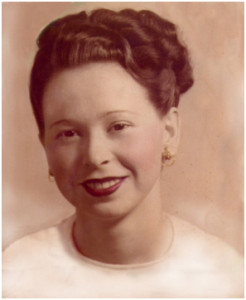 My Mama in 1942 at age 17. She is wearing her beautician’s uniform. She was the inspiration for Sylvia Richardson in Mama’ s Shoes.As Fitzgerald said, you only have your emotions to sell. I knew if I was going to write a novel that anyone wanted to read, I was going to have to sell my emotions. In Mama’s Shoes, I dug deep down inside myself to find the little girl who had grown up in a little coal mining town going to the beauty shops where her beautiful mama worked. I had to close my eyes and smell the cigarette smoke and beauty shop chemicals. I had to listen again to the women talk about having babies, husbands who got drunk and beat them, planting gardens and canning vegetables, and trying to raise their families amid the poverty and coal dust. And I had to put those sights and sounds on the page. I had to tell their stories by showing their emotions and mine.
My Mama in 1942 at age 17. She is wearing her beautician’s uniform. She was the inspiration for Sylvia Richardson in Mama’ s Shoes.As Fitzgerald said, you only have your emotions to sell. I knew if I was going to write a novel that anyone wanted to read, I was going to have to sell my emotions. In Mama’s Shoes, I dug deep down inside myself to find the little girl who had grown up in a little coal mining town going to the beauty shops where her beautiful mama worked. I had to close my eyes and smell the cigarette smoke and beauty shop chemicals. I had to listen again to the women talk about having babies, husbands who got drunk and beat them, planting gardens and canning vegetables, and trying to raise their families amid the poverty and coal dust. And I had to put those sights and sounds on the page. I had to tell their stories by showing their emotions and mine.
Those women taught me more about life than I ever learned anywhere else. It was their stories that I drew from to find the happiness and love, sadness and grief, and never-ending hope that created the world where my characters lived in Mama’s Shoes. The story is indeed fiction, but the emotion in Mama’s Shoes is real — drawn from the life of a 12-year-old girl struggling to grow up and find her way in a world.
There are rules you have to follow to master writing. All those grammar and syntax rules I mentioned are indeed important, but don’t forget the most important of all — emotion. Sometimes you have to cry and laugh or even bleed on the page. Whatever you do, you have to make your reader hear your voice, feel your characters’ pain, and rejoice in their happiness. When you do that, you’re on your way to being a writer.
 Rebecca D. Elswick is the award-winning author of Mama’s Shoes. Visit her website at http://www.rebeccaelswick.com/.
Rebecca D. Elswick is the award-winning author of Mama’s Shoes. Visit her website at http://www.rebeccaelswick.com/.
Takeaway Tweets
“You’ve got to sell your heart, your strongest reactions, not the little minor things that only touch you lightly.” Tweet This Sometimes you have to cry and laugh or even bleed on the page. Tweet This Make your reader hear your voice, feel your characters’ pain, and rejoice in their happiness. Tweet This
http://blog.abbottpress.com/sell-your...
Share This




 Sell Your Heart: When Real Life Becomes FictionPosted by Rebecca Elswick on Jun 27, 2013 in Guest Blogs |
Sell Your Heart: When Real Life Becomes FictionPosted by Rebecca Elswick on Jun 27, 2013 in Guest Blogs |

You’ve got to sell your heart, your strongest reactions, not the little minor things that only touch you lightly, the little experiences that you might tell at dinner. This is especially true when you begin to write, when you have not yet developed the tricks of interesting people on paper, when you have none of the technique which it takes time to learn. When, in short, you have only your emotions to sell.
— F. Scott Fitzgerald
When I was writing my first novel, Mama’s Shoes , I took great comfort from the legendary F. Scott Fitzgerald’s words. Writing a novel is a daunting task. It didn’t matter that I was an English teacher and knew how to use correct grammar, punctuation and syntax, or that I knew how to create setting and plot and put my characters in the throes of conflict. That didn’t make me a writer — at least not one anyone would necessarily care to read; what made me a writer is that in addition to having all the proper elements in a story, I added the one thing you won’t find in a style manual. Emotion.
 My Mama in 1942 at age 17. She is wearing her beautician’s uniform. She was the inspiration for Sylvia Richardson in Mama’ s Shoes.As Fitzgerald said, you only have your emotions to sell. I knew if I was going to write a novel that anyone wanted to read, I was going to have to sell my emotions. In Mama’s Shoes, I dug deep down inside myself to find the little girl who had grown up in a little coal mining town going to the beauty shops where her beautiful mama worked. I had to close my eyes and smell the cigarette smoke and beauty shop chemicals. I had to listen again to the women talk about having babies, husbands who got drunk and beat them, planting gardens and canning vegetables, and trying to raise their families amid the poverty and coal dust. And I had to put those sights and sounds on the page. I had to tell their stories by showing their emotions and mine.
My Mama in 1942 at age 17. She is wearing her beautician’s uniform. She was the inspiration for Sylvia Richardson in Mama’ s Shoes.As Fitzgerald said, you only have your emotions to sell. I knew if I was going to write a novel that anyone wanted to read, I was going to have to sell my emotions. In Mama’s Shoes, I dug deep down inside myself to find the little girl who had grown up in a little coal mining town going to the beauty shops where her beautiful mama worked. I had to close my eyes and smell the cigarette smoke and beauty shop chemicals. I had to listen again to the women talk about having babies, husbands who got drunk and beat them, planting gardens and canning vegetables, and trying to raise their families amid the poverty and coal dust. And I had to put those sights and sounds on the page. I had to tell their stories by showing their emotions and mine.Those women taught me more about life than I ever learned anywhere else. It was their stories that I drew from to find the happiness and love, sadness and grief, and never-ending hope that created the world where my characters lived in Mama’s Shoes. The story is indeed fiction, but the emotion in Mama’s Shoes is real — drawn from the life of a 12-year-old girl struggling to grow up and find her way in a world.
There are rules you have to follow to master writing. All those grammar and syntax rules I mentioned are indeed important, but don’t forget the most important of all — emotion. Sometimes you have to cry and laugh or even bleed on the page. Whatever you do, you have to make your reader hear your voice, feel your characters’ pain, and rejoice in their happiness. When you do that, you’re on your way to being a writer.
 Rebecca D. Elswick is the award-winning author of Mama’s Shoes. Visit her website at http://www.rebeccaelswick.com/.
Rebecca D. Elswick is the award-winning author of Mama’s Shoes. Visit her website at http://www.rebeccaelswick.com/. Takeaway Tweets
“You’ve got to sell your heart, your strongest reactions, not the little minor things that only touch you lightly.” Tweet This Sometimes you have to cry and laugh or even bleed on the page. Tweet This Make your reader hear your voice, feel your characters’ pain, and rejoice in their happiness. Tweet This
Published on June 30, 2013 20:07
June 25, 2013
Teachers Love Summer Vacation TOO
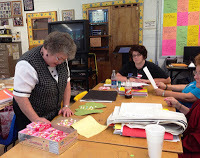
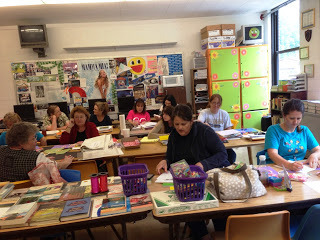 I am a teacher/writer, and I spent my first week of summer vacation facilitating a workshop for teachers called Strategies for Teaching Writing. As a teacher consultant for the Appalachian Writing Project(AWP), (http://people.uvawise.edu/awp/) I am dedicated to coaching teachers on how to use more writing in their classes regardless of the subject area.
I am a teacher/writer, and I spent my first week of summer vacation facilitating a workshop for teachers called Strategies for Teaching Writing. As a teacher consultant for the Appalachian Writing Project(AWP), (http://people.uvawise.edu/awp/) I am dedicated to coaching teachers on how to use more writing in their classes regardless of the subject area.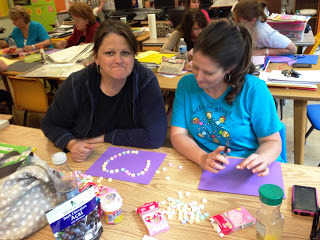
AWP is part of the National Writing Project, an organization networked across the country and anchored in colleges and universities. It's mission: "The National Writing Project focuses the knowledge, expertise, and leadership of our nation's educators on sustained efforts to improve writing and learning for all learners." (http://www.nwp.org/cs/public/print/do...).
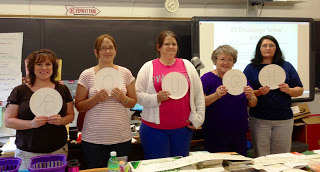 Fourteen teachers from six different school districts gathered for a week of learning about and exchanging best practices for teaching writing. These ladies had just walked out of their classrooms and into mine. Their jobs ranged from teaching grades kindergarten to high school with subjects ranging from English to Art. They were tired and worn-out from all the duties and responsibilities of ending a school year, but they were ready to soak up new strategies to take back to their classrooms - classrooms they had just left.
Fourteen teachers from six different school districts gathered for a week of learning about and exchanging best practices for teaching writing. These ladies had just walked out of their classrooms and into mine. Their jobs ranged from teaching grades kindergarten to high school with subjects ranging from English to Art. They were tired and worn-out from all the duties and responsibilities of ending a school year, but they were ready to soak up new strategies to take back to their classrooms - classrooms they had just left.Dedication. These ladies are perfect examples of dedicated teachers. They soaked up the new activities, research, and presentations like they were fresh, rested and ready to charge back into the classroom the next day.They shared one of their best teaching strategies and demonstrated how it was used in their classrooms.
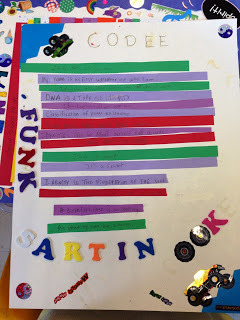
We discussed ways to engage our students, and we shared ways to help our students learn how to communicate through writing.
AWP Teacher consultants came to the workshop to do demonstrations they had prepared. We discussed:
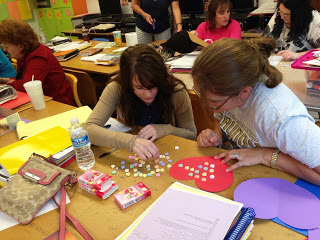
Motivating the Reluctant Writer
Hook, Line, and Reel Them In: Writing Great Opening Lines
Book Arts (How to make books and journals with our studentsOral History and Writing in the Primary Classroom
Appalachian Literature and Local Authors
Evaluating and Publishing Your Students’ Work
Making Writing Meaningful
Boys Will Be Writers—How to Narrow the Performance Gap Between Boys and Girls
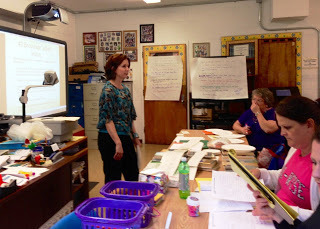
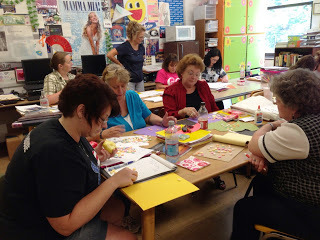
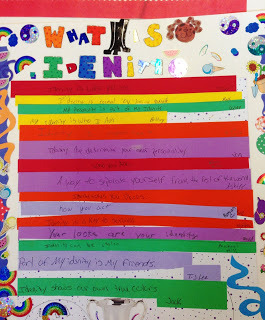 We discussed how to use journals as a tool to teach writing and shared topics for student writing.
We discussed how to use journals as a tool to teach writing and shared topics for student writing.We even went on a scavenger hunt in the library to "find" poems!
On the last day of the workshop, we used Skype technology to talk to Dr. Amy Clark, professor at UVA Wise and co-author of the book Talking Appalachian . Amy told the group about the research that went into this book, and how we, as teachers, can use it to help our students in Appalachia understand their English is not "wrong". We can teach our students that the language of their region is a "living testament to its rich heritage."
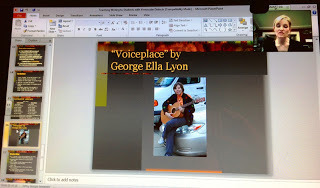 The book contains essays and excerpts from works by authors such as George Ella Lyon and Silas House.The group left Amy's discussion talking about how to teach our students how to "code-switch" from their "home-voice" to more standard English. By teaching them where their language/dialect comes from, we are empowering them in the classroom and beyond.
The book contains essays and excerpts from works by authors such as George Ella Lyon and Silas House.The group left Amy's discussion talking about how to teach our students how to "code-switch" from their "home-voice" to more standard English. By teaching them where their language/dialect comes from, we are empowering them in the classroom and beyond.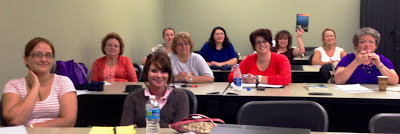
Do teachers like summer vacation? Of course we do! But this group of dedicated ladies gave up a week of their summer vacation to gather a toolbox of ideas and activities for their upcoming classes. They know that the summer will speed by and soon they will be standing in front of a group of fresh faces, ready to learn!
Published on June 25, 2013 19:13
May 27, 2013
On This Day We Remember
Memorial Day - hailed as the beginning of summer.
Today is marked with picnics, grilling outdoors, and treks to the family cemetery to honor those who served their country. American flags are prominently displayed all over town and in the cemetery where my father is buried, the veterans of Buchanan County have placed flags on all of the veterans' graves.
My father has one of those flags on his grave because he was a WWII Army Veteran.
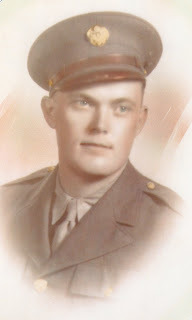 Frank H. Davis
Frank H. Davis
Growing up, I knew my daddy was a WWII veteran. The scar on his hand that wrapped around his wrist was evident. This was the result of the first time he was wounded. Even more prominent was his limp from the metal plate in his ankle. This was from the second time he was wounded, and this one got him sent home after spending a month in an overseas hospital. By the time he was nineteen he had been wounded twice.
I remember vividly the first time I saw his Purple Heart. I was a little girl, and my mother was cleaning out a chest of drawers. She pulled it out and showed it to me and my younger brother. I wasn't old enough to know exactly what it stood for, but I knew that it was somehow sacred - that it was something my father had earned while in the war. It would be many years before I knew exactly what it stood for.
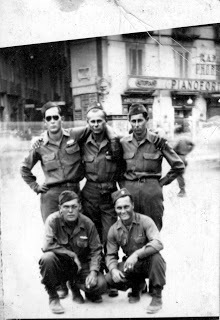 My father is kneeling at left. He has a cigarette in one hand and a black eye. I asked him once how he got it and he said he didn't remember but he bet "he gave as good as he got."
My father is kneeling at left. He has a cigarette in one hand and a black eye. I asked him once how he got it and he said he didn't remember but he bet "he gave as good as he got."
My father served in the US Army Third Infantry Division European Campaign. For his service he earned the Purple Heart with one oak leaf cluster and two bronze service stars. He never talked about the war and when he was asked his standard answer was, "I don't remember." But often bits of information would seep into the conversation, like the day he was watching the movie "Patton" and made the remark, "He was a bigger SOB than anybody knew." I asked, "How do you know?" And he said in a matter-of-fact voice, "I drove that SOB all over Europe."
From what I could gather, my father was assigned to the vehicle garage as a driver and one night he ended up taking a jeep to General Patton who liked his driving, so my dad ended up as his personal driver for a while. He was also fond of saying it was the Infantry that "broke Hitler's back" not Patton's tanks.
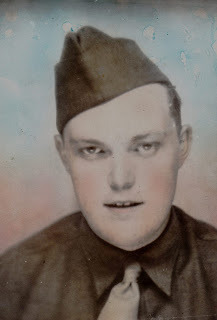
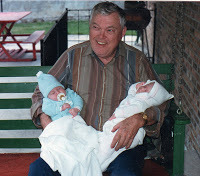
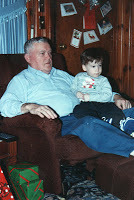
On this Memorial Day, I remember my father, the man who was a WWII veteran and so much more. He was a loving father and grandfather.
He was a bus driver and coal miner and he loved to put out a garden.
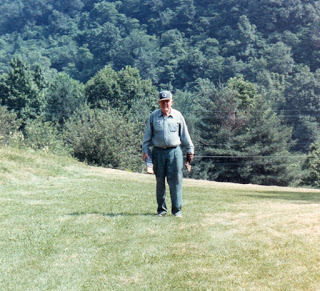 Daddy would work second or third shift at the mines and then come to my house where he put out a big garden, still wearing his mining clothes.
Daddy would work second or third shift at the mines and then come to my house where he put out a big garden, still wearing his mining clothes.
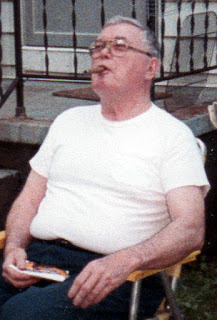 And he loved a good cigar after a meal.
And he loved a good cigar after a meal.
On this Memorial Day, I salute my father, Frank H. Davis for his service to his country. I am honored to be his daughter.
Today is marked with picnics, grilling outdoors, and treks to the family cemetery to honor those who served their country. American flags are prominently displayed all over town and in the cemetery where my father is buried, the veterans of Buchanan County have placed flags on all of the veterans' graves.
My father has one of those flags on his grave because he was a WWII Army Veteran.
 Frank H. Davis
Frank H. DavisGrowing up, I knew my daddy was a WWII veteran. The scar on his hand that wrapped around his wrist was evident. This was the result of the first time he was wounded. Even more prominent was his limp from the metal plate in his ankle. This was from the second time he was wounded, and this one got him sent home after spending a month in an overseas hospital. By the time he was nineteen he had been wounded twice.
I remember vividly the first time I saw his Purple Heart. I was a little girl, and my mother was cleaning out a chest of drawers. She pulled it out and showed it to me and my younger brother. I wasn't old enough to know exactly what it stood for, but I knew that it was somehow sacred - that it was something my father had earned while in the war. It would be many years before I knew exactly what it stood for.
 My father is kneeling at left. He has a cigarette in one hand and a black eye. I asked him once how he got it and he said he didn't remember but he bet "he gave as good as he got."
My father is kneeling at left. He has a cigarette in one hand and a black eye. I asked him once how he got it and he said he didn't remember but he bet "he gave as good as he got."My father served in the US Army Third Infantry Division European Campaign. For his service he earned the Purple Heart with one oak leaf cluster and two bronze service stars. He never talked about the war and when he was asked his standard answer was, "I don't remember." But often bits of information would seep into the conversation, like the day he was watching the movie "Patton" and made the remark, "He was a bigger SOB than anybody knew." I asked, "How do you know?" And he said in a matter-of-fact voice, "I drove that SOB all over Europe."
From what I could gather, my father was assigned to the vehicle garage as a driver and one night he ended up taking a jeep to General Patton who liked his driving, so my dad ended up as his personal driver for a while. He was also fond of saying it was the Infantry that "broke Hitler's back" not Patton's tanks.



On this Memorial Day, I remember my father, the man who was a WWII veteran and so much more. He was a loving father and grandfather.
He was a bus driver and coal miner and he loved to put out a garden.
 Daddy would work second or third shift at the mines and then come to my house where he put out a big garden, still wearing his mining clothes.
Daddy would work second or third shift at the mines and then come to my house where he put out a big garden, still wearing his mining clothes. And he loved a good cigar after a meal.
And he loved a good cigar after a meal.On this Memorial Day, I salute my father, Frank H. Davis for his service to his country. I am honored to be his daughter.
Published on May 27, 2013 12:47



